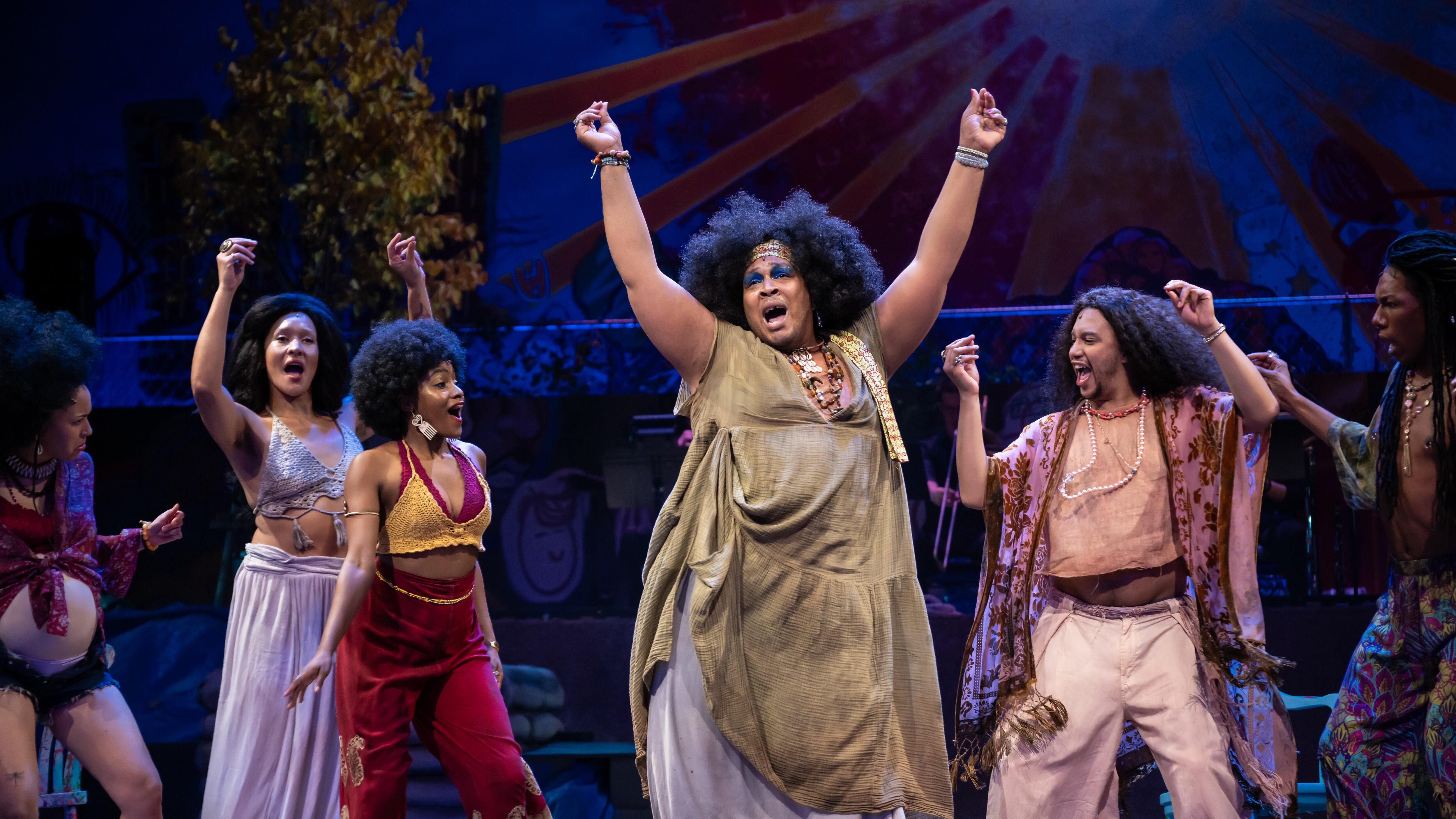Seeing Hair at Portland Center Stage raises a question: Is the trippy, hippie musical that opened on Broadway in 1968 still relevant today?
For some audience members, the Age of Aquarius depicted in the show, with its communal spirit and “love will steer the stars” mentality, is appealing, especially for those who are still haunted by the isolation of the Age of COVID. Yet with this new production, directed by Isaac Lamb, the connections between 1968 and 2023 are loud and clear. Among the 43 songs in this impressionistic rock opera is one that’s a list of racial slurs, “Colored Spade,” and another about air pollution, both of which could be taken from today’s headlines.
Hair, though, embodies an aching hopefulness that might seem naïve to contemporary audiences. The play starts with Dionne (Olivia Lucy Phillip, mesmerizing), beckoning to her friends, a group of barefoot counterculturists, to join her on stage as she sings “Aquarius.” The song, which was popularized by The 5th Dimension in 1969 and became an upbeat favorite on mainstream radio, broke down barriers back in the day, appealing to people of all ages. Yet considering the ferocious division in our society now, the optimism of “Aquarius” and its hope for a new era of “harmony and understanding” is gut-wrenching.
Inevitably, some of the ‘60s druggie culture in the play comes across as a little silly, like when the character Woof (Antonio Lopez-Villarreal) dreamily says things like “I love the flowers” and “we are all one” before howling at the moon. When the company lovingly chants the names of drugs in “Hashish” (“cocaine, marijuana, opium, LSD”), too, it’s impossible not to think, “Yeah, but what about the 70,000 fentanyl-related deaths in the U.S. last year?”
Still, the innocence of the characters’ pleasures is sincere. Taking place in a sort of urban garden with flower pots, rakes and stacks of potting soil, the set (designed by Diggle) suggests the characters have created their own version of the Garden of Eden. Even a chain-link fence is softened with bright pink, blue and green whirligig-type flowers, which are reminiscent of kindergarten craft projects and lend an atmosphere of cheerful childhood sweetness to the production.
That sweetness can also be seen in a scene where the characters travel across the stage, melting into each other’s arms before moving on to another lover or joining a group of copulators in an undulating clump. Lucy Wells’ costume designs add to the feeling of fluidity—everyone is dressed in flowing garments, with vests hanging open or a long scarf cascading from a pocket.
The play blends easily from one song to another, smoothed by Muffie Delgado Connelly’s choreography. Instead of the formal dance routines of traditional Broadway productions, the characters wave their arms above their heads and skip and twirl in a circle, much like children on a playground, unfettered by the inhibitions of adults.
Not all of Hair is so dreamy. The ensemble story eventually focuses on Claude (a warm and engaging Solomon Parker III), who’s about to be drafted and sent to Vietnam. While rejecting his critical, conservative parents and their orders to get any job, no matter how meaningless, he also yearns to do more with his life and sings about wanting to “perform miracles.”
When Claude complies with the government’s demand to go to war anyway, he pays a heavy price. Even before that, though, it’s both shocking and heartbreaking to see him in uniform with his glorious afro—a symbol of personal freedom—shorn off.
The play ends with another popular song, “Let the Sunshine In,” as red and yellow leaves flutter to the ground like bits of autumn sunlight. Like “Aquarius,” with which it was often performed as a medley, the song was a buoyant pop anthem in 1969, but here it’s a plea for peace that we’ve yet to find in 2023.
SEE IT: Hair plays at Portland Center Stage at the Armory, 128 NW 11th Ave., 503-445-3700, boxoffice@pcs.org. 7:30 pm Wednesday–Saturday, 2 pm Thursday, Saturday and Sunday, through Nov. 5. $35.50-$91. 14+.
